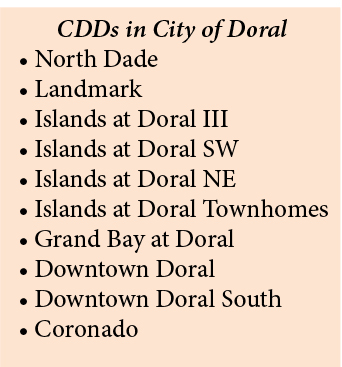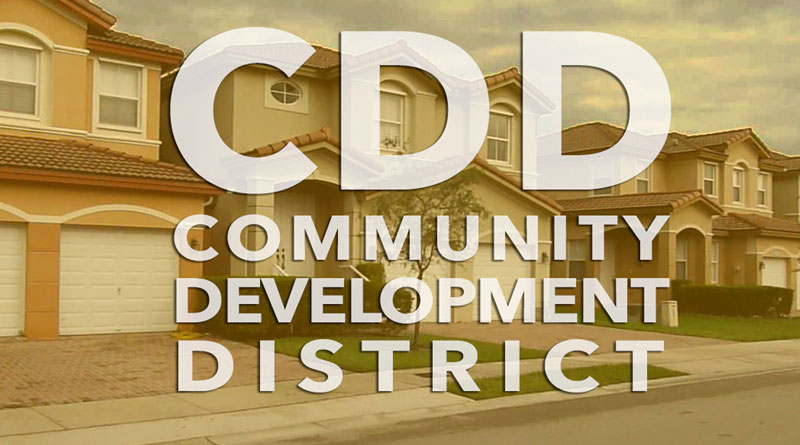What is a Community Development District?
Get answers, get informed, participate in your community and be part of the change.
By Diana Bello Aristizábal
Since the first CDD was established in Miami-Dade County in 1998, under the name of Beacon Tradeport Community Development District (Dolphin Mall), many concerns have arisen among the community about what it means to live in a “district”. For this reason, in this issue, we will tell you everything you need to know about CDDs.
According to the document ‘Community Development Districts Workshop,’ available in the City of Doral’s website, a CDD is an independent governmental unit created to serve the long-term needs of its community regarding planning, financing, construction, operation, and maintenance of infrastructures and services that are designed for the benefit of its residents.
Districts are established by a developer or landowner with the government approval. “They are very similar to municipalities and counties, they have a governing body with policy-making powers; and operate in a limited geographical area”, as it is stated in the document.
But how do they work? The process begins when a landowner wants to build a development. The next step is to seek the advice of a group of engineers, who evaluate and determine what needs to be implemented so that the real estate project becomes a reality in accordance with the type of units that will be part of it.
Engineers can recommend, for example, to build a road, increase the land level, make a drainage system or any other public improvement necessary for the project to operate. Subsequently, the developer presents the project to the city and, once approved, to the county. If it has more than 1000 acres, it must be submitted to the State, in Tallahassee.
Once all the permits for the development are granted, the developer determines the amount of money that is needed to build through a CDD, if this is the choice, this then turns into a government bond which is free of taxes and usually for a term of 30 years.
When the CDD is endorsed, it is established what each homeowner, that owns a parcel in the district, will pay in order to settle the debt corresponding to the bond. The financial obligation of each unit is directly related to the size and benefit it receives.
In this way, a Community Development District is, mainly, a financing mechanism for the private and public sectors to govern, build, operate and maintain essential public services and facilities.
However, the fact that homeowners help pay off the debt is something that many people do not agree with because they think it should be the developers’ responsibility to do so as part of their business investment. Against this, the main argument is that if they did, the final sale price of each unit would be increased.
On the other hand, many people find excessive to have to pay this bond through their taxes, if you take into consideration that in Doral, specifically, properties usually have a high price that ranges between 350 thousand and 3 million dollars.
To talk about this, we consulted with two companies that manage Community Development Districts in Florida and one of them stated that living in a district has additional benefits because although it is clear that all real estate projects must comply with minimum requirements to operate, CDDs go beyond the norm.
“There is a general belief that people who do not pay extra, are somehow better than people who do, but if a storm happens, don’t you rather live in a place where streets drain perfectly?”, says Luis Hernandez, District Manager of GMS (Governmental Management Services).
By the closing of this issue, we could not get a response from Special District Services, Inc., another company that manages CDDs in the State, and from which we wanted to get their point of view on this matter because they were in an audit process.
How are CDDs regulated?
Chapter 190 of the Florida Statutes, approved in 1980, is the backbone of the Community Development Districts because it delimits what they are and aren’t allowed to do in order to operate.
Before this governmental unit was created, if a developer wanted to initiate a real estate project, the procedure was to go to the city or county to present the improvements intended to perform in a certain land and wait for approval. Once that happened, all city or county residents paid a portion of those improvements as part of the ‘ad valorem’ tax.
The problem was that, often times, due to the lack of independence in decision-making and factors out of the control of the real estate developers, many years went by before a project came to life.
Because of this, in the 1980s a group of lawyers presented a bill in Tallahassee, known as Chapter 190, with the purpose of allowing CDDs to absorb the costs of public infrastructure.
Since districts were created, in order to be supervised some mechanisms of control were instituted, such as the need to send out annual financial reports, annual financial audits, performed by an independent Certified Public Accountant, and information concerning advance notice of bond sales and new bond issues.
On the other hand, they are also required to comply with ethics laws, conduct district business within the Government-in-the-Sunshine laws, including specific public meeting requirements, among other obligations.
Furthermore, after completing the first 6 years of operation and having a minimum of 250 registered voters, matching with the number of residents within the CDD, the community can participate in an electoral process that takes place every two years.
It should be noted that the geographical limits of a CDD are determined in concordance with the financial and land needs of a specific area. This means that in the same development, such as Islands at Doral, several districts can coexist, each one operating as an independent governmental unit.
During election times, residents elect the five-member Board of Supervisors, responsible for deciding which improvements should be executed. Some seats are elected every two years and others every four and elections only take place in even years.
As a guarantee of transparency and to avoid fraud, the electoral process is controlled by the Miami-Dade County Supervisor of Elections, an entity regulated by the State of Florida.
Individuals who intend to run as candidates to occupy seats in the Board of Supervisors must first register with this entity and demonstrate compliance with certain requirements to apply. The selected members begin their mandate on November 20.
In addition to the Supervisor of Elections, the CDDs also report to the Department of Financial Services, Auditor General and the Department of Economic Opportunity, among other control mechanisms. They must also conform to 30 general laws that equally apply to counties and municipalities.
How to know if a home sits within a CDD?
 Although districts are widely regulated and known, especially in a recent year in Doral they are relatively new. For this reason, many people who have bought homes in the city were not duly informed about them, while others overlooked the information received about it due to the large volume of documents collected at the moment of purchase.
Although districts are widely regulated and known, especially in a recent year in Doral they are relatively new. For this reason, many people who have bought homes in the city were not duly informed about them, while others overlooked the information received about it due to the large volume of documents collected at the moment of purchase.
Additionally, some homeowners pay their obligations without asking questions about their bills or statements even when having doubts, which increases the disinformation and disapproval that surrounds this topic.
However, Miami-Dade is one of the strictest counties in presenting information about CDDs. For this reason, residents are always sent home a document known as Trim Notice, in which all property taxes to be paid are broken down, including those in the non-ad valorem assessments section where the CDD tax is shown.
Along with this document, a letter explaining the details about the district is also enclosed, it also includes contact information such as phone number, website address and a person in charge.
For all this, Doral Family Journal invites the community to be up-to-date with regards to this tax, attend public meetings, ask questions as many times as necessary, read the fine print of property agreements and be informed about what you are paying.
It should be noted that when districts fail to comply with a requirement, state and local agencies, as well as citizens, can take action, such as filing ethics complaints with the Commission on Ethics, while the state attorney for the area can investigate and prosecute district officials who violate Government-in-the-Sunshine laws.
Also, the Governor may remove elected or appointed officials under certain circumstances and the entity that created the special district can amend, merge or dissolve it.

